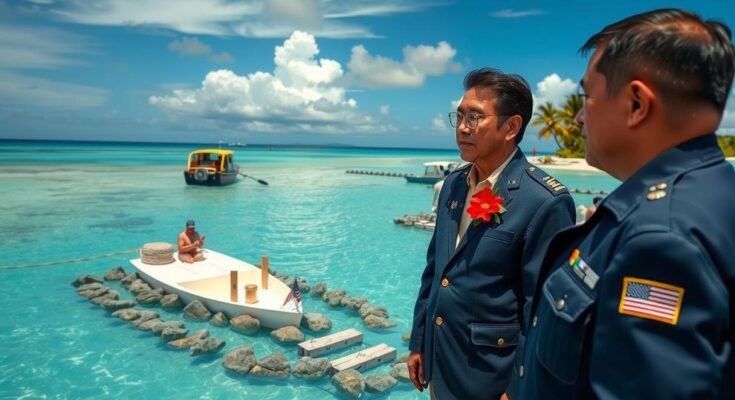Taiwan’s President Lai Ching-te visited Tuvalu on December 4, strengthening ties amidst growing climate change challenges. Following his arrival from the Marshall Islands, he emphasized the importance of international support for Tuvalu, particularly as it faces submersion risks. The diplomatic engagement is part of a larger tour to other Pacific allies, including Guam and Palau, amid rising tensions with China.
On December 4, Taiwan’s President Lai Ching-te arrived in Tuvalu, reinforcing the relationship between Taiwan and this island nation. His visit signifies Taiwan’s commitment to support Tuvalu, especially regarding the challenges posed by climate change, which threatens the very existence of its low-lying atolls. President Lai’s arrival was confirmed by a Tuvalu official, marking an important diplomatic engagement during his tour of Pacific allies.
Following his visit to Tuvalu, President Lai plans to travel to Guam before heading to Palau, continuing a diplomatic tour dedicated to strengthening partnerships with Pacific nations. This visit follows Prime Minister Feleti Teo’s reaffirmation of ties with Taiwan after he assumed office in February and attended Taiwan’s national day celebrations in October.
Tuvalu, which has a population of approximately 11,000 individuals across nine atolls, is increasingly vulnerable to rising sea levels, with projections indicating that significant parts of its capital may be submerged by 2050. Consequently, Tuvalu is heavily reliant on international aid, with Taiwan playing a pivotal role in providing support. To enhance connectivity, Tuvalu will soon receive its first international telecommunications link through a subsea cable, a collaborative effort involving Taiwan, Australia, the United States, and Japan.
Additionally, Tuvalu’s recent national election garnered attention from China, given its strategic competition for influence in the Pacific. Amidst these dynamics, Chinese military pressure on Taiwan has intensified. Lai’s diplomatic mission is crucial not only for fostering relationships but also for addressing regional security in light of these growing tensions.
The visit from President Lai underscores Taiwan’s strategic emphasis on maintaining and strengthening its diplomatic relationships with Pacific allies, particularly in response to the looming threats of climate change and geopolitical tensions involving China. Tuvalu’s vulnerability to rising sea levels positions Taiwan’s support as vital, facilitating essential infrastructure projects and reinforcing their alliance. This region is increasingly significant in global politics, notably due to China’s aggressive posturing regarding Taiwan’s sovereignty. The Pacific Islands have become focal points for international diplomacy, with countries like Taiwan, Australia, the United States, and Japan actively seeking to support nations like Tuvalu as they navigate existential environmental challenges while asserting their sovereignty amidst external pressures from larger powers like China.
In summary, President Lai Ching-te’s visit to Tuvalu reflects Taiwan’s dedication to reinforcing its diplomatic ties with Pacific nations amid pressing issues such as climate change. This strategic engagement is critical not only for supporting vulnerable nations like Tuvalu but also for countering China’s growing influence in the region. As President Lai continues his Pacific tour, he aims to foster cooperation among allied nations to ensure their resilience and safeguard their autonomy in the face of international pressures.
Original Source: www.channelnewsasia.com




